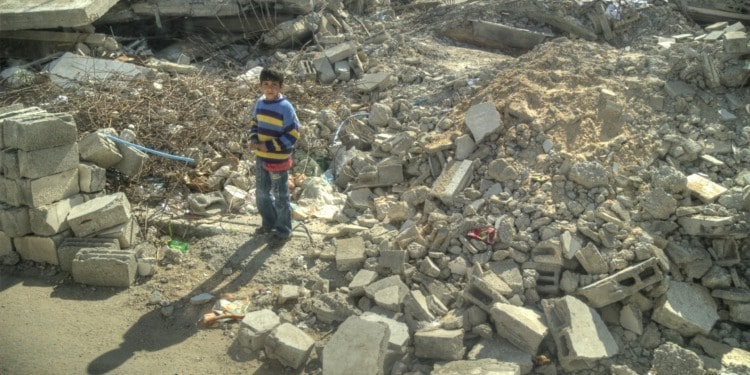It all started on Monday, when, hours after European Union (EU) officials announced that aid to Palestinians would be discussed on Tuesday, EU Enlargement Commissioner Olivér Várhelyi declared on social media that the Commission would “immediately suspend” all aid payments to Palestinians in response to the recent Hamas attacks on Israel.
“As the biggest donor of the Palestinians, the European Commission is putting its full development portfolio under review, worth a total of EUR 691m,” the Commissioner added.
Várhelyi, a Hungarian, was nominated for the Enlargement Commissioner position by Prime Minister of Hungary Viktor Orban, who is known to have maintained a close relationship with his Israeli counterpart Benjamin Netanyahu. A senior Hungarian official remarked in 2020 that Orban and Netanyahu “belong to the same political family.”
The scale of terror and brutality against #Israel and its people is a turning point.
There can be no business as usual.
As the biggest donor of the Palestinians, the European Commission is putting its full development portfolio under review, worth a total of EUR 691m
⤵️— Oliver Varhelyi (@OliverVarhelyi) October 9, 2023
Várhelyi’s post immediately prompted confusion and scrutiny from member states, raising questions about the legality and rationale behind such a move. Ireland and Luxemburg were the first to respond.
“[O]ur understanding is that there is no legal basis for a unilateral decision of this kind by an individual Commissioner and we do not support a suspension of aid,” a spokesperson for Irenland’s foreign ministry said.
Ireland also emphasized the critical role of international assistance for Palestinians, stating that approximately 80% of Palestinians relied on it for survival. Similarly, Dutch Prime Minister Mark Rutte said “there’s no question of [suspending aid] at the moment,” adding:
“We really have to make the distinction between Hamas, the terror organisation, and very innocent Palestinians who are just as much victims right now, and again, in the case of Gaza, have been for 16 years. And have to live under the yoke of a terrible terrorist regime.”
Spain, Portugal, and France also voiced their concerns publically. Citing EU diplomats, Reuters reports that other countries did so too, just not publically. For Italy, Palestinian aid suspension isn’t up for discussion.
“This cooperation must continue,” Spanish Acting Foreign Minister of Spain Jose Manuel Albares said on Tuesday, “we cannot confuse Hamas, which is in the list of EU’s terrorist groups, with the Palestinian population, or the Palestinian Authority or the United Nation’s organisations on the ground. For Albares, suspending aid to Palestinians would be “counterproductive.”
As to France, according to its foreign ministry it is “not in favour of suspending aid which directly benefits the Palestinian populations.” Acting Foreign Minister of Luxembourg Jean Asselborn shared the same message about his government, saying:
“Two million people live in Gaza. They are also hostages of Hamas. With these [aid suspension] methods, we push them into the arms of terrorists.”
Austria, on the other hand, announced that it has suspended aid to Palestinians in response to the Hamas attacks while Germany said it is “temporarily suspending” development aid to Palestinians, vowing to review the programs and adding that it would continue to send humanitarian aid.
Related articles: Hungary Blocks Ukrainian Aid Package; EU Responds by Freezing Funds | ‘In it Together’: More Humanitarian Aid for Ukraine | How the EU Commission Leads the Battle to Save the Planet
Six hours after Várhelyi’s post, the European Commission issued a statement saying that “there were no payments foreseen” and that there would thus be “no suspension of payments.”
Things got even more confusing when the EU’s diplomacy chief Josep Borrell said that the bloc would not suspend “due payments,” contradicting the Commission’s earlier statement.
“The suspension of the payments — punishing all the Palestinian people — would have damaged the EU interests in the region and would have only further emboldened terrorists,” Borell wrote.
The review of the EU's assistance for Palestine announced by the European Commission will not suspend the due payments, as clarified by the Commission’s press release.
— Josep Borrell Fontelles (@JosepBorrellF) October 9, 2023
The Commission did however clarify that it would continue to send humanitarian aid, which is different from development aid. It also announced that it is conducting an “urgent review of the EU’s assistance for Palestine” — applying to development aid only — to “ensure that no EU funding indirectly enables any terrorist organization to carry out attacks against Israel.”
The episode also shed light on the different responses by EU institutions. The headquarters of the European Commission, for example, displayed an Israeli flag while the European Council’s building lit up but refrained from displaying the flag (see tweets below).
Solidarity with Israel. pic.twitter.com/6YoIHRugUF
— European Commission (@EU_Commission) October 7, 2023
In solidarity with the victims of the terrorist attacks against Israel, the @EUCouncil's Europa building has been lit up. pic.twitter.com/qn4shzfwgo
— EU Council (@EUCouncil) October 8, 2023
As one EU official told Politico: “Israel-Palestine is one of the most divisive issues in the EU. The intra-European divisions on this conflict are almost as old as the conflict itself.”
The bloc’s decision to review Palestinian aid in response to recent events underscores the complex task of balancing support for humanitarian and development needs with geopolitical considerations. The EU, which officially supports a two-state solution, must navigate these delicate waters to uphold its commitment to humanitarian assistance while considering the broader political landscape and ensuring aid does not indirectly fund or support terrorism.
Editor’s Note: The opinions expressed here by the authors are their own, not those of Impakter.com — In the Featured Photo: Destruction of Gaza. Featured Photo Credit: Wikimedia Commons.









